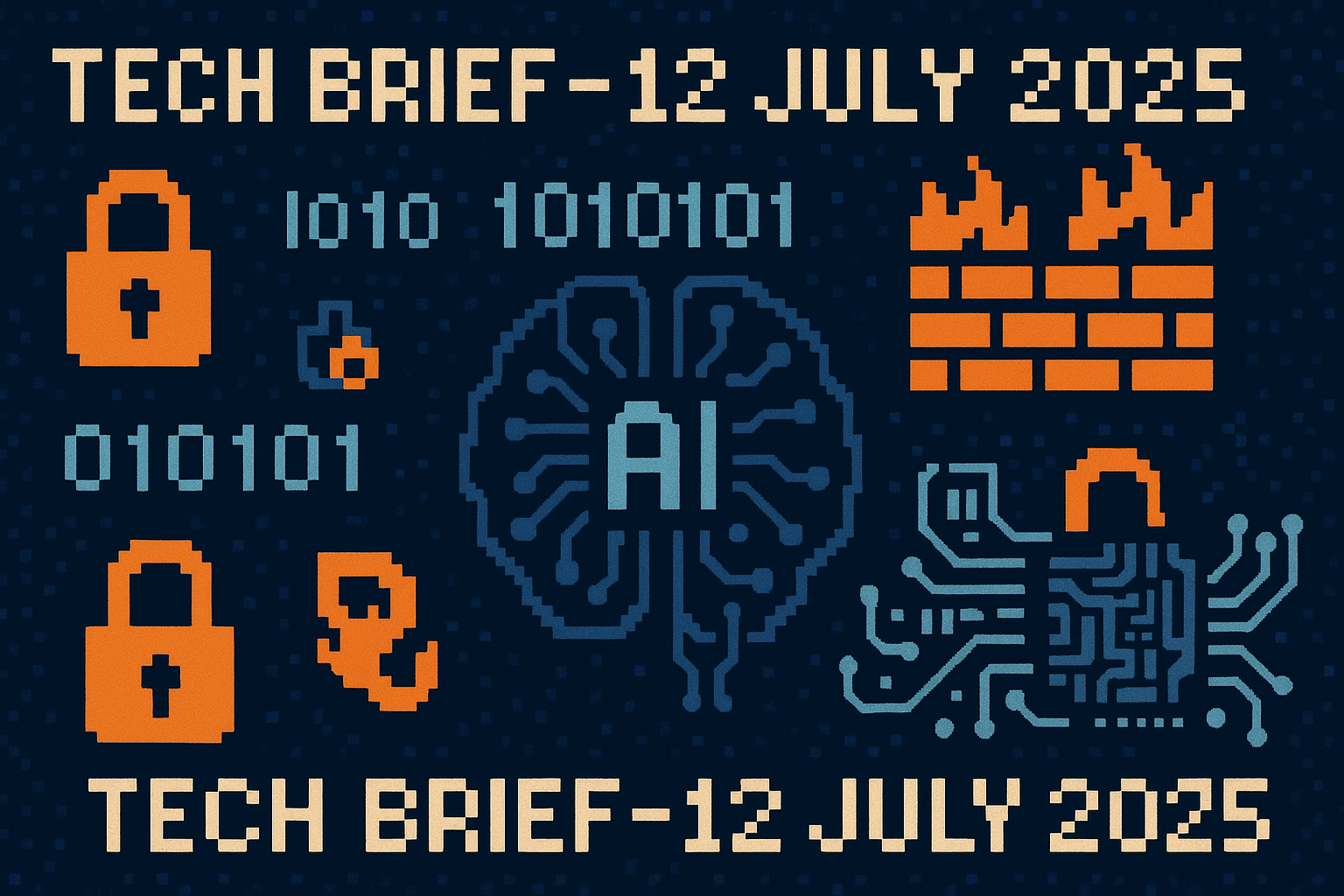
Remember when we thought watermarks would protect our holiday photos from being copied? That same naive optimism just died in a research lab. Tech Brief – 12 July 2025 brings sobering news about AI’s double-edged nature. Artists’ digital shields are cracking, job platforms are cutting their own staff, and we’ve lost a coding legend who kept the web’s backbone running.
Today’s Tech Brief Roundup
Tech to protect images against AI scrapers can be beaten, researchers show
The digital equivalent of watermarking your negatives has failed spectacularly. Researchers reportedly cracked Nightshade and Glaze image protection tools with an 80% success rate using noise injection and colour space modifications, per The Register’s coverage of University of Chicago research.
These defenses were meant to protect creative work from unauthorised AI scraping. Instead, attackers bypass them with roughly 12% Gaussian noise and HSV colour shifts. For anyone who remembers the futility of Macrovision on VHS tapes, this feels depressingly familiar. Every lock eventually finds its key.
The reported failure rates speak volumes: 79.5% for Glaze, 83% for Nightshade. For photographers and illustrators banking on these tools, it’s a harsh reminder that technical solutions rarely solve social problems. The real issue isn’t the algorithm. It’s who controls the data.
Charity warns AI-generated child sex abuse videos ‘now as lifelike as real footage’
The Internet Watch Foundation reportedly identified 1,286 AI-generated child abuse videos in H1 2025, per MSN coverage of their findings. These aren’t crude deepfakes anymore. They’re photorealistic, created using Stable Diffusion and custom training models that evade traditional detection systems.
Current hash-matching databases miss 68% of AI-generated content. The technology that democratised digital art has become a weapon against the most vulnerable. It’s a stark reminder that every breakthrough carries unintended consequences.
The UK’s Online Safety Act faces urgent amendments to criminalise AI-generated abuse material. But legislation always lags behind technology. The real battle happens in the code, where detection algorithms race against generation tools in an arms race nobody wanted.
Looks like 1,300 Indeed and Glassdoor staffers will need their former employer’s websites
The irony cuts deep. Recruit Holdings reportedly laid off 1,300 employees across Indeed and Glassdoor, citing AI-driven efficiency gains via GPT-4 Turbo implementation, per The Register. Content moderation and HR analytics teams made way for algorithmic decision-making.
The reported £42 million annual savings come from eliminating human judgement in favour of automated systems. Affected staff received severance packages tied to NDAs and six months of premium access to the job platforms they once maintained.
It’s a perfect circle of modern employment: build the tools that replace you, then use those same tools to find your next gig. The dot-com layoffs of 2001 feel quaint by comparison. At least then, humans were firing humans.
Rimini Street, Oracle edge toward truce after years of legal warfare
Oracle and Rimini Street reportedly resolved their 15-year litigation involving £630 million in penalties, per The Register’s account of settlement terms. The agreement grants Rimini limited API access for legacy database support while Oracle drops claims against third-party JD Edwards maintenance.
For businesses stuck on Oracle 11g and 12c, this truce could slash support costs. Rimini’s read-only API access means compatibility checks without vendor lock-in. A rare victory for enterprise pragmatism over corporate warfare.
The deal echoes the SCO versus Linux battles of the early 2000s. Sometimes the lawyers get tired before the technology dies. Legacy systems outlive their creators, and someone has to keep the lights on.
British Perl guru Matt Trout dead at 42
The Perl community lost a giant this week. Matt Trout, reportedly a maintainer of DBIx::Class and co-founder of London.pm, died at 42 according to The Register’s obituary. His object-relational mapping tools underpin countless web applications that still power banking and telecoms infrastructure.
Trout championed Perl’s relevance against newer languages, calling it “the COBOL of the internet age” in a 2023 interview. His bare-metal debugging workshops taught a generation of developers to think beyond frameworks and understand the machine beneath.
His death highlights a growing crisis in legacy language maintenance. The developers who built the web’s foundation are aging out, and their knowledge goes with them. We owe these unsung architects more recognition than they ever received. A memorial hackathon is planned for August 15th.
From the Wayback Machine
On This Day: 1949 – IBM’s Thomas J. Watson Jr. predicted that “all moving parts in machines would be replaced by electronics” within ten years. Speaking at a company sales meeting, Watson Jr. envisioned the shift from mechanical tabulators to electronic circuits. His forecast proved prescient. IBM’s first electronic computer, the 701, arrived in 1952, and by 1958 the company had embraced solid-state technology entirely. The prediction set IBM on course to dominate not just calculators but the entire computing industry, proving that technological foresight beats incremental thinking every time.
What This Means
Tech Brief – 12 July 2025 reveals technology’s persistent double bind: every solution creates new problems. AI tools meant to protect artists fail against basic attacks. Job platforms automate away their own workforce. Legal battles over legacy code finally end in compromise. The pattern holds. We build systems faster than we understand their consequences. The real question isn’t whether technology will disrupt everything, but whether we’ll learn to manage the disruption before it manages us.
The best debugging happens when you understand both the code and the human who wrote it.
Missed yesterday’s Tech Brief? Catch up here.

Leave a Reply